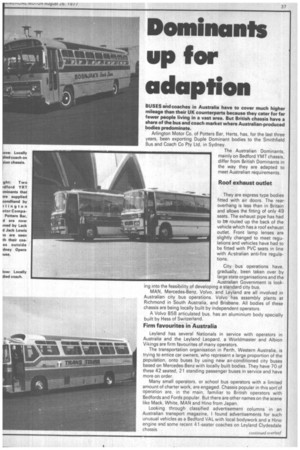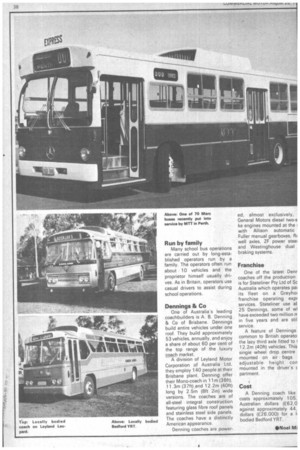Dominants up for adoption
Page 39

Page 40

If you've noticed an error in this article please click here to report it so we can fix it.
BUSES and coaches in Australia have to cover much higher mileage than their UK counterparts because they cater for far fewer people living in a vast area. But British chassis have a share of the bus and coach market where Australian-produced bodies predominate.
Arlington Motor Co, of Potters Bar, Herts, has, for the last three years, been exporting Duple Dominant bodies to the Smithfield Bus and Coach Co Pty Ltd, in Sydney.
The Australian Dominants, mainly on Bedford YMT chassis, differ from British Dominants in the way they are adapted to meet Australian requirements.
Roof exhaust outlet
They are express type bodies fitted with air doors. The rear. overhang is less than in Britain and allows the fitting of only 49 seats. The exhaust pipe has had to b routed up the back of the vehicle which has a roof exhaust outlet. Front lamp lenses are slightly changed to meet regulations and vehicles have had to be fitted with PVC seats in line with Aestralian anti-fire regulations.
City bus operations have, gradually, been taken over by large state organisations and the Australian Government is looking into the feasibility of developing a standard city bus.
MAN, Mercedes-Benz, Volvo, and Leyland are all involved in Australian city bus operations. Volvo has assembly plants at Richmond in South Australia, and Brisbane. All bodies of these chassis are being locally built by independent operators.
A Volvo B58 articulated bus, has an aluminium body specially built by Hess of Switzerland.
Firm favourites in Australia
Leyland has several Nationals in service with operators in Australia and the Leyland Leopard, a Worldmaster and Albion Vikings are firm favourites of many operators.
The transportation organisation in Perth, Western Australia, is trying to entice car owners, who represent a large proportion of the population, onto buses by using new air-conditioned city buses based on Mercedes-Benz with locally built bodies. They have 70 of these 42 seated, 21 standing passenger buses in service and have more on order.
Many small operators, or school bus operators with a limited amount of charter work, are engaged. Chassis popular in this sort of operation are, in the main, familiar to British operators with Bedfords and Fords popular. But there are other names on the scene like Mack, White, MAN and Hino from Japan.
Looking through classified advertisement columns in an Australian transport magazine, I found advertisements for such unusual vehicles as a Bedford VAL with local bodywork and a Hino. engine and some recent 41-seater coaches on Leyland Clydesdale chassis
Run by family
Many school bus operations are carried out by long-established operators run by a family. The operators often run about 10 vehicles and the proprietor himself usually drives. As in Britain, operators use casual drivers to assist during school operations.
Dennings & Co
One of Australia's leading coachbuilders is A. B. Denning & Co of Brisbane. Dennings build entire vehicles under one roof. They build approximately 53 vehicles, annually, and enjoy a share of about 60 per cent of the top range of the luxury coach market.
A division of Leyland Motor Corporation of Australia Ltd, they employ 140 people at their Brisbane plant. Denning offer their Mono-coach in 11m (36ft), 11.3m (37ft) and 12.2m (40ft) long by 2.5m (8ft 2in) wide versions. The coaches are of all-steel integral construction featuring glass fibre roof panels and stainless steel side panels. The coaches have a distinctly American appearance.
Denning coaches are power ed, almost exclusively, General Motors diesel two-s ke engines mounted at the with Allison automatic Fuller manual gearboxes, IR( well axles, ZF power steel and Westinghouse dual braking systems.
Franchise
One of the latest Denr coaches off the production is for Stateliner Pty Ltd of Sc Australia which operates pai its fleet on a Greyhoi franchise operating expr services. Stateliner use at 25 Dennings, some of wl have exceeded two million rr in five years and are stil service.
A feature of Dennings common to British operatoi the lazy third axle fitted to I 12.2m (40ft) vehicles. This single wheel drop centre mounted on air bags adjustable height con mounted in the driver's c partment.
Cost
A Denning coach like costs approximately 105, Australian dollars (£62,0 against approximately 44, dollars (£26,000) for a bodied Bedford YRT.
*Noel Mi












































































